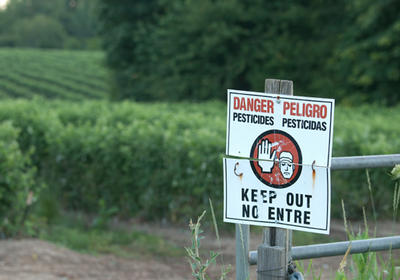Are Hidden Pesticides Putting Your Health at Risk?
Thursday, July 19, 2012 3:06 PM
By Rick Ansorge
 |
Everyone knows that pesticides kill bugs. However, these poisons are bad for people, too, and are linked to health problems ranging from irritation of skin, eyes, and lungs to nervous system toxicity, ADHD, cancer, hormone system effects, and miscarriages.
But pesticides are so widespread that it’s impossible to completely avoid them.
In the United States, an estimated 1.2 billion pounds of chemical pesticides are used each year. It gets into water supplies and works its way up the food chain from plants to animals to you.
Many commonly consumed, conventionally produced foods contain shockingly high levels of pesticide residues. According to the USDA, such residues are found in 99 percent of non-organic milk samples and 100 percent of butter samples. Almost 70 percent of all conventional wheat-flour samples contain detectable levels of pesticides.
SPECIAL: These 5 Things Flush 40 lbs. of Fat Our of Your Body
“It’s probably the case that any non-organic food or beverage is suspect,” says Warren Porter, professor of zoology and environmental toxicology at the University of Wisconsin. Pesticides are “molecular bulls in a china shop” that can penetrate and damage any cell in the body, including those in the brain, ovaries, and testicles, he says.
The best way to minimize pesticide intake is to consume organic products, Porter tells Newsmax Health. He also recommends avoiding the use of bug-killing chemicals in your home and yard whenever possible. Many homeowners spray routinely for bugs as a precaution, even before they see any insects. If you must spray, do so only after you spot unwanted insects. And Porter recommends taking off your shoes when entering your home to avoid tracking in poisons.
Going organic can be extremely expensive, but experts say you can reduce the cost by making smart choices. For example, conventional grass-fed beef is less likely than grain-fed beef to contain antibiotics, and it is much cheaper than organic beef.
Also, conventional chicken labeled as “raised without antibiotics” may be as safe as organic chicken and less expensive. Pesticide levels usually are not significantly different between conventional chicken and organic chicken.
In addition, conventional eggs seldom contain pesticides and antibiotics.
Each year, the Environmental Working Group, a nonprofit public health organization, releases its “Clean 15” list of produce containing the least amount of pesticide. Typically, these are fruits and vegetables with a peel. The 2012 list includes onions, corn, pineapples, avocados, cabbage, sweet peas, asparagus, mangoes, eggplant, kiwi, cantaloupe (domestic), sweet potatoes, grapefruit, watermelon, and mushrooms.
When you do buy organic, it may be cheaper to purchase from local farmers. Plus, local produce is often fresher and therefore more healthful. Of course, growing your own food is even better, although it is not possible for everyone.
WHAT YOU CAN DO
According to the EPA, these sensible food practices can significantly reduce the amount of pesticides you get from food:
• Wash. Thoroughly wash and scrub all fresh fruits and vegetables under running water, which is more effective than soaking at removing surface chemicals, bacteria, and dirt. Because some pesticides can penetrate into the flesh, however, washing cannot remove all pesticide residues.
• Peel and trim. Remove the peel of apples and other fruits and vegetables whenever it is practical. Remove the outer leaves of lettuces and other leafy vegetables. Trimming the fat from meat, poultry, and fish provides a double benefit: It will remove some pesticide residues that collect in fat, and reduce your intake of cholesterol and saturated fat.
• Eat a variety of foods from a variety of sources. You’ll help reduce the likelihood of exposure to a single pesticide and achieve a healthier mix of nutrients.
© 2012 Newsmax. All rights reserved. http://www.newsmaxhealth.com